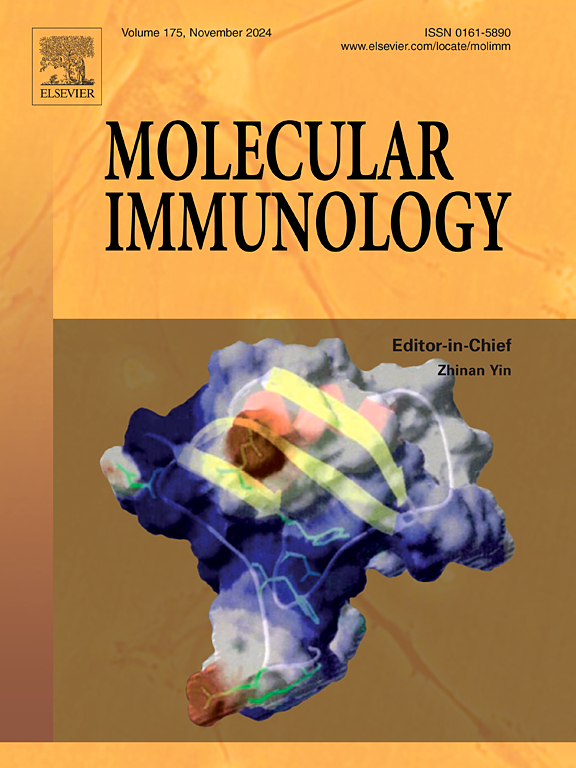一种用于检测肿瘤患者体内抗ny - eso -1抗体和监测癌症治疗的间接ELISA方法
IF 3
3区 医学
Q2 BIOCHEMISTRY & MOLECULAR BIOLOGY
引用次数: 0
摘要
癌症的早期诊断为有效治疗提供了最好的机会。检测睾丸癌抗原(CTA)的血清学检测有助于癌症的诊断、预后和治疗评估。由于NY-ESO-1在几种癌症类型中诱导强烈的免疫反应,因此被认为是抗体测定开发的有吸引力的CTA。在大肠杆菌中重组制备NY-ESO-1全长蛋白,纯化后用于间接酶联免疫吸附试验(ELISA)检测NY-ESO-1特异性抗体。采用78例确诊癌症患者的血清、健康供者(n = 20)和类风湿关节炎患者(n = 43)的对照血清,对该ELISA进行了优化和验证。优化后的NY-ESO-1 ELISA对癌症患者的敏感性为96.2 %,对非癌症供体的特异性为100% %。一项对接受癌症治疗的患者的随访研究表明,抗体水平对治疗有反应,在治疗成功后抗体水平变为极低或阴性,在确认肿瘤转移复发前抗体水平再次上升。采用NY-ESO-1全序列重叠肽的比较多肽ELISA检测并没有提高检出率,但确实显示了共同的表位。基于NY-ESO-1蛋白的ELISA可用于检测潜在的癌症患者,并可用于监测癌症治疗和治疗后肿瘤复发。本文章由计算机程序翻译,如有差异,请以英文原文为准。
An indirect ELISA for the detection of anti-NY-ESO-1 antibodies in cancer patients and for monitoring cancer therapy
Early diagnosis of cancer offers the best chance for effective treatment. Serological tests for the detection of cancer testis antigens (CTA) could aid in cancer diagnosis, prognosis, and treatment evaluation. Since NY-ESO-1 induces a strong immune response in several cancer types, it is considered an attractive CTA for antibody assay development. The full-length NY-ESO-1 protein was recombinantly produced in Escherichia coli, purified, and used to develop an indirect enzyme-linked immunosorbent assay (ELISA) for the detection of NY-ESO-1 specific antibodies. This ELISA was optimized and validated using serum samples collected from 78 confirmed cancer patients and control sera from healthy donors (n = 20) and rheumatoid arthritis patients (n = 43). The optimized NY-ESO-1 ELISA provided a sensitivity of 96.2 % in cancer patients and a specificity of 100 % for non-cancer donors. A follow-up study of patients undergoing cancer treatment indicated that the antibody levels were responsive to therapy, becoming very low or negative after successful treatment and rising again before tumor metastasis recurrence was confirmed. Comparative peptide ELISA using overlapping peptides of the full NY-ESO-1 sequence did not improve the detection rate, but did reveal common epitopes. The NY-ESO-1 protein-based ELISA could be used to detect potential cancer patients and is useful for monitoring cancer therapy and tumor recurrence after treatment.
求助全文
通过发布文献求助,成功后即可免费获取论文全文。
去求助
来源期刊

Molecular immunology
医学-免疫学
CiteScore
6.90
自引率
2.80%
发文量
324
审稿时长
50 days
期刊介绍:
Molecular Immunology publishes original articles, reviews and commentaries on all areas of immunology, with a particular focus on description of cellular, biochemical or genetic mechanisms underlying immunological phenomena. Studies on all model organisms, from invertebrates to humans, are suitable. Examples include, but are not restricted to:
Infection, autoimmunity, transplantation, immunodeficiencies, inflammation and tumor immunology
Mechanisms of induction, regulation and termination of innate and adaptive immunity
Intercellular communication, cooperation and regulation
Intracellular mechanisms of immunity (endocytosis, protein trafficking, pathogen recognition, antigen presentation, etc)
Mechanisms of action of the cells and molecules of the immune system
Structural analysis
Development of the immune system
Comparative immunology and evolution of the immune system
"Omics" studies and bioinformatics
Vaccines, biotechnology and therapeutic manipulation of the immune system (therapeutic antibodies, cytokines, cellular therapies, etc)
Technical developments.
 求助内容:
求助内容: 应助结果提醒方式:
应助结果提醒方式:


